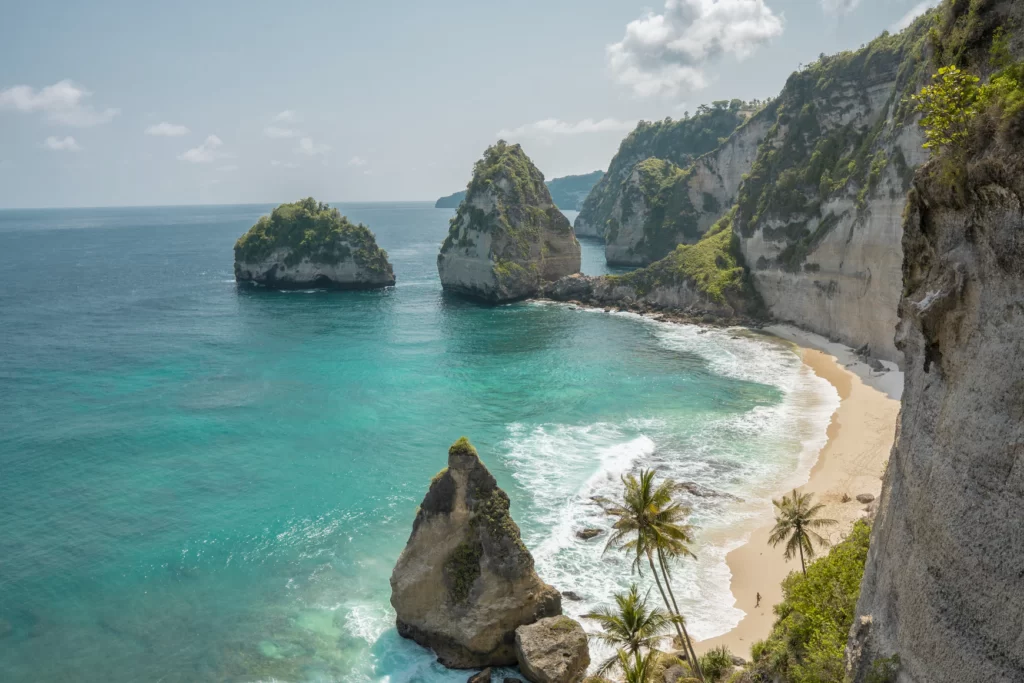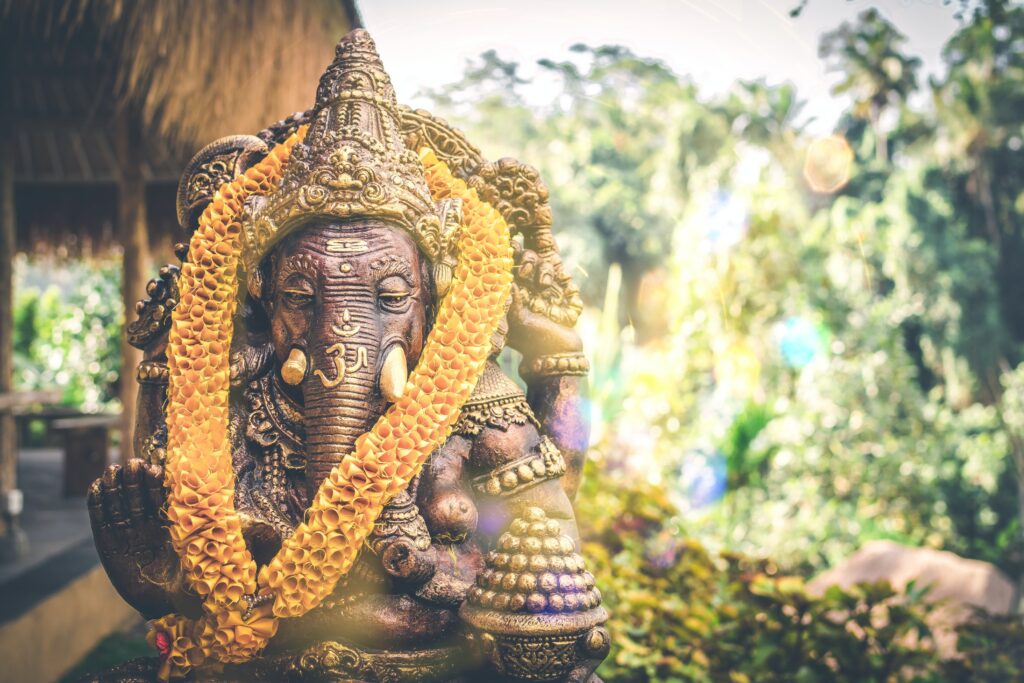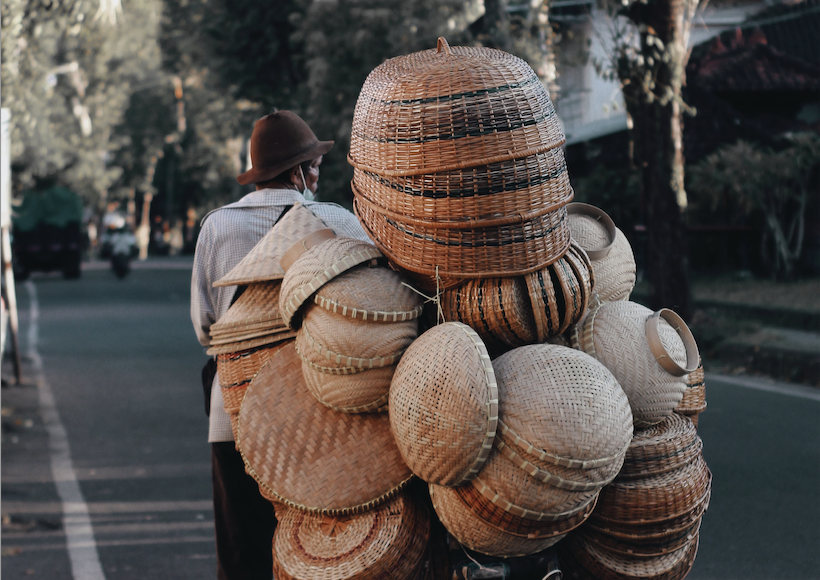Why we love Indonesia
An archipelago of over 17,000 islands where no two days feel the same. Mist gathers over rice terraces at dawn; jungles hum with life; and boats trace the horizon between coral reefs and volcanic peaks. The air smells of salt and clove, incense and rain. From Bali to Komodo, Sulawesi to Raja Ampat, Indonesia unfolds slowly — a story told island by island. This guide shares everything you need to know before you go.

Entry requirements
British and American citizens travelling for tourism can apply for a visa on arrival at a cost of £22. It’s valid for 30 days and can be extended once, for another 30 days, at an immigration office in Indonesia. You can also apply for an e-visa before you travel via this website or at the airport on arrival.
A tourism levy is now required to enter Bali. We recommend paying online through the Love Bali Official website before arrival to avoid queues. The levy costs IDR 150,000 per person (roughly £7.50–8). Keep your voucher handy to scan at checkpoints.
Everyone arriving in Indonesia also needs to complete the “All Indonesia” Arrival Card within 72 hours of arrival. It combines health, customs and immigration forms into one and can be filled out online or through the official app, generating a QR code you’ll need to show on entry.
Health and safety
We are not certified to give medical advice, but we recommend you consult your doctor about your vaccination history and discuss any further vaccinations you may need for your trip. We recommend this website for travel vaccination information and advice on bringing medication into the country.

Getting around
We can arrange private airport transfers so you start your trip smoothly. Just send us your flight details and we’ll take care of the rest. For multi-stop itineraries, we’ll coordinate transfers between regions and hotels. Domestic flights and ferries link the islands, and we can book these for you as part of your journey.
Climate and packing tips
We strongly recommend that you carry overnight essentials and any medication in your hand luggage, particularly if connecting to an onward destination, in the event of lost luggage or delays.
Indonesia is warm and tropical all year round, with average temperatures sitting between 25–30°C. The dry season runs from April to October, bringing sunny days and calm seas. The wet season from November to March brings more rain and humidity, especially in rainforest regions.
What to pack:
Light cotton or linen clothing – keeps you cool in the humidity.
Light rain jacket or poncho – handy for tropical downpours.
Swimwear – for beaches, pools and snorkelling trips.
Sarong or scarf – for covering shoulders at temples or doubling as a beach wrap.
Sandals or flip-flops – for the islands and easy walks.
Trainers or closed shoes – for jungle hikes or volcano treks.
Sunhat, sunglasses and sun cream – the sun is strong year-round.
Insect repellent – especially useful at dawn and dusk.
Warm layer – for cool mountain evenings in places like Ubud or Java’s highlands.
Water bottle – many hotels offer refill stations to reduce plastic waste.

Laws and customs
Here are our top tips for respecting Indonesia’s laws and customs, but please check the latest government advice before you travel.
– Always carry identification – a physical copy of your passport and visa is best. Immigration officials or police may ask to see it at any reasonable time.
– Dress modestly, particularly when visiting religious sites such as temples or mosques. Cover your shoulders and knees, and remove your shoes before entering sacred spaces.
– Show respect for local traditions during the holy month of Ramadan. Avoid eating, drinking or smoking in public during daylight hours in Muslim-majority areas.
– When photographing individuals, ceremonies or sacred sites, always ask permission first.
Tipping
Tipping practices in Indonesia are generally low-key but more common in tourist areas.
Hotels and restaurants often add a five to ten per cent service charge to the bill. If this is not included, leaving a similar amount is welcomed. Tips can be given in either Indonesian rupiah or US dollars, but rupiah is generally easier for staff. Hand tips directly to the individual where possible rather than leaving them on the table.
Guides – around $5 per traveller per day.
Drivers – around $3 per traveller per day.
Porters and hotel staff – $1–2 per bag or per day for housekeeping.
Taxi drivers – tipping is not expected, but rounding up the fare is a nice gesture.
Money matters
The official currency is the Indonesian Rupiah (IDR). ATMs are widely available in cities and tourist hubs, and credit cards are accepted at most hotels and larger restaurants. In rural areas or markets, cash is essential.

Practicalities
Plug types: Indonesia uses plug types C and F. Both have two round pins, though type F includes side earth clips.
Flights and time zones: The fastest direct flight from London to Indonesia is around 14 hours. Indonesia spans several time zones, with the capital Jakarta at GMT +7, Bali at GMT +8 and Papua at GMT +9.
Languages: The official language of Indonesia is Bahasa Indonesia. English is commonly spoken in major tourist areas, hotels and restaurants, but less so in rural regions.
Here are a few useful phrases:
Hello – Halo
Thank you – Terima kasih
Please – Tolong / Silakan
Yes / No – Ya / Tidak
How much is this? – Berapa harganya?
Excuse me / Sorry – Permisi / Maaf
I need help – Saya butuh bantuan
Where is the bathroom? – Di mana kamar mandi?

Food and drink
Indonesian food is vibrant, aromatic and full of bold flavours. You’ll find plenty of spice, fragrant herbs, coconut milk and rice at the heart of most dishes.
Here are some iconic foods and drinks to try on your trip:
Nasi Goreng: Indonesia’s beloved fried rice dish, often served with egg on top and customised spice levels depending on the region.
Rendang: A slow-cooked beef dish from Sumatra, simmered in coconut milk and spices until tender and packed with flavour.
Gado-Gado: A refreshing salad of blanched vegetables, tofu and hard-boiled eggs topped with a creamy peanut dressing.
Bakso: Popular street-food meatball soup, often served with noodles and vegetables in a savoury broth.
Sambal: A fiery chilli paste that accompanies almost every meal – perfect for spice lovers.
Coffee: Indonesia is renowned for its coffee-growing regions – try a cup of Sumatran or Javanese brew, or the iconic Kopi Luwak if you’re feeling adventurous.
Keep connected
Most travellers use an Indonesian SIM or e-SIM. These are easy to buy on arrival at major airports such as Jakarta or Bali, and our local partners can help you get set up if needed. If you’d like to be connected as soon as you land, we recommend purchasing an e-SIM in advance through a trusted provider such as Airalo.
